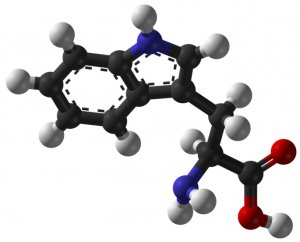Do you have trouble falling asleep at night? If so, you may be lacking tryptophan – an essential amino acid that plays an important role in the production of serotonin (the happy chemical) and melatonin (the sleep hormone). Because of the strong relationship between tryptophan and melatonin, tryptophan supplements are among the most popular natural sleep supplements.
At Recharge.Energy, we’re dedicated to offering the most accurate information and advice to help you improve your sleep. That’s why, in this guide, we discuss everything you need to know about tryptophan for sleep buying.
You’ll learn about what tryptophan is, how it can help you, and the specific sleeping problems it’s used for. We’ll also cover some frequently asked questions regarding tryptophan. If you’re thinking about using tryptophan for sleep, consider this your complete guide.
The information on Recharge.Energy.com is not meant to replace professional advice or meant to be used to prevent, diagnose, or treat any disease or illness. Always consult your doctor before trying any products you see on this site.
What is tryptophan?
Tryptophan is an essential amino acid, meaning, first and foremost, that it’s one of the building blocks of proteins. Simply put, the human body uses amino acids to make proteins to help the body with all kinds of functions including: creating tissues, forming antibodies, forming red blood cells, and many others.
Tryptophan is one of the most important essential amino acids for the production of the neurotransmitter serotonin (also known as the happy chemical) and the production of the hormone melatonin (also known as the sleep chemical)[1]Tryptophan.
When tryptophan metabolizes, it forms a compound called 5-HTP (5-Hydroxytryptophan). 5-HTP is necessary for the production of serotonin, which is necessary for the production of melatonin. [2]ACCURATE EDUCATION – L-TRYPTOPHAN & 5-HTP (5-HYDROXYTRYPTOPHAN) Here’s a representation of the process:
Steps to create serotonin through tryptophan:
Tryptophan —► 5-Hydroxytryptophan (5-HTP) —► 5-Hydroxytryptamine —► Serotonin
Steps to create melatonin through tryptophan:
Tryptophan —► 5-Hydroxytryptophan (5-HTP) —► 5-Hydroxytryptamine —► Serotonin —► N-acetyl-serotonin —►Melatonin
Tryptophan can help you improve your sleep but to be really effective you must combine it with proper sleep hygiene.
Tryptophan and sleep

Both serotonin and melatonin contribute to our ability to sleep. Serotonin is known to improve our mood and state of mind. It also helps to control nervousness, aggressiveness, and anxiety [3]What is serotonin and what does it do?. In short, serotonin provides the peace of mind we need to be able to fall asleep and stay asleep throughout the night.
Likewise, melatonin is directly involved in our ability to sleep, as it’s the hormone that makes us feel sleepy. Like serotonin, melatonin helps us fall asleep more easily and stay asleep throughout the night[4]A review of sleep disorders and melatonin.
Since tryptophan is an “essential” amino acid, it cannot be produced by the body and must
be obtained entirely through the diet. If you don’t frequently eat foods rich in tryptophan, you might want to consider tryptophan for sleep.
Is your diet lacking tryptophan?
Tryptophan is one of the scarcest amino acids, meaning tryptophan isn’t abundant in many foods. That being said, foods that contain protein are typically the best sources of tryptophan. So, if you have a low-protein diet, you may be tryptophan-deficient. Below is a list of foods that contain tryptophan:
- Poultry
- Fish
- Eggs
- Carrots
- Green leafy vegetables
- White cheeses, yogurt, or kefir
- Beets, celery
- Broccoli
- Avocado
- Dates
- Pumpkin, sunflower, or sesame seeds
- Whole grains like oatmeal or rice
- Nuts
- Dark chocolate
- etc.
Using tryptophan for sleep
Because tryptophan is necessary for the production of serotonin and melatonin, tryptophan supplements are often used to treat insomnia and, specifically, insomnia caused by anxiety.
But insomnia isn’t the only sleep problem for which tryptophan is useful. Tryptophan for sleep may also help with:

Insomnia caused be jet lag
When we travel to a new time zone, it often takes a couple of days to adjust to our new sleep schedules. All of a sudden, we have to get to sleep at what feels like a much earlier or much later time. That’s because, even though we’re in a new time zone, our bodies are still producing melatonin as if we’re in our old time zone. It takes a few days for our bodies to adjust to our new sleep schedule and produce melatonin at the right times.
Tryptophan supplementation may be an effective solution for jet lag. Supplementing with tryptophan can help regulate our production of melatonin so that we adjust to our new time zone more quickly. The extra boost in serotonin may also help with mood swings caused by jet lag.

Insomnia caused by night shift work
People who work at night and have to sleep during the day often suffer from insomnia due to an imbalance in their circadian rhythms[5]Shift Work: Disrupted Circadian Rhythms and Sleep—Implications for Health and Well-Being. In addition, many night shift workers also experience irritability, aggressiveness, nervousness, and depression[6]Shift Work Tied to Poor Mental Health.
Tryptophan for sleep may be especially effective for night shift workers. Supplementing with tryptophan can help regulate their production of melatonin to help stabilize their circadian rhythms. The extra boost in serotonin may also help boost their mood and improve their mental health.

Insomnia in athletes
Many athletes suffer from insomnia due to stress and excessive travel. Tryptophan for sleep can help athletes manage their stress and enjoy better sleep. It can also help alleviate the symptoms of jet lag while traveling. [7]Influence of Tryptophan and Serotonin on Mood and Cognition with a Possible Role of the Gut-Brain Axis
In addition to fixing athletes’ sleep problems, tryptophan has been found to improve athletic performance, reduce feelings of fatigue, and increase pain tolerance [8]L-tryptophan Supplementation Can Decrease Fatigue Perception During an Aerobic Exercise With Supramaximal Intercalated Anaerobic Bouts in Young Healthy Men[9]Effect of L-tryptophan Supplementation on Exercise Performance.
Benefits of taking tryptophan to improve sleep
Tryptophan is one of the most popular natural sleep supplements and with good reason.
- Tryptophan helps us sleep more and better.
- Many studies indicate that tryptophan is both effective and safe.
- Tryptophan is a natural substance that the body needs to perform many vital functions.
- It’s one of the scarcest essential amino acids in food, so supplementation is often necessary to treat tryptophan deficiency.
- Tryptophan can help promote relaxation and improve mood.
- Tryptophan is a natural substitute for other more aggressive drugs.
- There are hardly any side effects, and side effects rarely occur.
Additional benefits of tryptophan supplementation
Tryptophan supplements to treat depression, nervousness, or anxiety
Tryptophan may be an effective treatment for anxiety and depression. Its effectiveness has even been compared to that of some antidepressant drugs[10]L-5-hydroxytryptophan alone and in combination with a peripheral decarboxylase inhibitor in the treatment of depression[11]L-5-hydroxytryptophan alone and in combination with a peripheral decarboxylase inhibitor in the treatment of depression[12]Effects of tryptophan depletion on anxiety and on panic provoked by carbon dioxide challenge.
Tryptophan to stop smoking
Because serotonin reduces withdrawal symptoms, tryptophan supplementation may be effective in helping smokers quit smoking. [13]Tryptophan and high-carbohydrate diets as adjuncts to smoking cessation therapy
Tryptophan supplements for obesity
Increased serotonin is known to be effective in reducing caloric intake in obese patients. It’s been shown that during tryptophan supplementation, patients reduced the calories they ingested, especially from foods rich in carbohydrates[14]The anorectic effect of increasing doses of L-tryptophan in obese patients.
Tryptophan to treat chronic pain
Tryptophan supplementation in conjunction with a proper diet can be very effective in treating chronic pain. Studies have shown that in some cases it can eliminate pain completely or reduce it by up to 50%[15]Pain relief by dietary manipulation and tryptophan supplements[16]A trial of l_tryptophan in chronic pain syndrome.
Tryptophan supplements to improve memory
Serotonin has been observed to improve cognitive functions. Applying a treatment with tryptophan may improve memory and boost the capacity for learning[17]Dose-dependent effects of tryptophan on learning and memory[18]Effects of tryptophan loading on human cognition, mood, and sleep.
Tryptophan treatments to relieve premenstrual syndrome
Some women take tryptophan supplements to alleviate their mood, tension, or irritability disorders resulting from PMS[19]A placebo-controlled clinical trial of L-tryptophan in premenstrual dysphoria.
Tryptophan to improve fibromyalgia symptoms
Tryptophan treatment may be effective for improving fibromyalgia symptoms such as anxiety, pain, quality of sleep, and fatigue[20]Double-blind study of 5-hydroxytryptophan versus placebo in the treatment of primary fibromyalgia syndrome[21]Primary Fibromyalgia Syndrome and 5-Hydroxy-L-Tryptophan: A 90-Day Open Study.
Tryptophan supplements for migraine
Migraines occur when serotonin levels are low. Tryptophan supplementation may relieve migraine symptoms, including pain[22]Migraine Mystery Solved?.
Tryptophan for seasonal affective disorder
Tryptophan has been shown to be an effective remedy for improving symptoms of seasonal affective disorder[23]Tryptophan hydroxylase 2 in seasonal affective disorder: underestimated perspectives?.
Tryptophan Supplements - FAQ
Who can take tryptophan for sleep?
Tryptophan supplements are generally safe for adults, but it’s a good idea to check with your doctor before beginning any kind of supplementation.
Who should not take tryptophan supplements?
You should not take tryptophan if:
- If you are pregnant or breastfeeding
- If you have a disorder that affects white blood cell levels
- If you have liver or kidney problems
- If you are taking any medication to treat depression or another type of medication that increases serotonin in the body. Excessive serotonin can have serious consequences for your health[24]L-tryptophan.
- If you are taking sedatives.
- If you are taking supplements that are increasing serotonin levels such as hops, kava or California poppy, St. John’s wort, etc.
The list above may not be complete. You can use online drug checkers to test interactions between tryptophan and other medications you’re taking. You should also consult your doctor for professional advice.
It isn’t recommended to administer to children unless prescribed by a doctor.
Recommended dose of tryptophan
According to several studies, the effective dose to treat sleep problems with L-Tryptophan is 1 to 2 grams per day. [25]Effects of L-tryptophan on sleepiness and on sleep You can also supplement with 5-HTP instead of tryptophan. In this case, it’s recommended to take between 200 – 400 mg of 5-HTP daily[26]L-tryptophan & 5-HTP (5-Hydroxytryptophan).
It’s always best to start with a small dose and work your way up until you achieve the desired results. Also, you should never exceed the dosage recommended by the manufacturer.
When should I take tryptophan?
It’s recommended to take tryptophan supplements for sleep an hour before going to bed[27]L-Tryptophan.
Side effects
Tryptophan is generally considered safe. When taken properly, side effects are rare.
That being said, possible side effects include: stomach pain or burning, belching and excess gas, nausea, vomiting, diarrhea, and loss of appetite. Side effects may also include headache, lightheadedness, drowsiness, dry mouth, blurred vision, muscle weakness, and impotence.
Other natural sleep supplements
There are many natural sleep supplements that can improve your quality of sleep, including melatonin, valerian, and magnesium.
Melatonin
Melatonin (also known as the sleep hormone) is a hormone produced in the pineal gland of our brain that causes sleepiness and helps us synchronize our 24-hour sleep-wake cycle known as our circadian rhythm. Melatonin production is essential to be able to fall asleep quickly and to stay asleep throughout the night. If you have a hard time falling asleep and/or you find yourself waking up several times during the night, your body may be producing too little melatonin.
Interested in learning more? Check out the complete guide:
Melatonin for Sleep | Natural melatonin for improving sleep/a>
Magnesium
Magnesium is a very important mineral that participates in almost all vital bodily processes. Magnesium is important for sleep because it helps calm the central nervous system, reduce stress, relax our muscles, and lower our blood pressure. It also helps regulate our circadian rhythm. Despite its relevance to our health and sleep, many people don’t include enough magnesium-rich foods, such as nuts or green leafy vegetables, in their diet. Because magnesium plays an important role in helping us sleep, it’s common for people with magnesium deficiency to suffer from insomnia.
Interested in learning more? Check out the complete guide:
Magnesium for sleep
Valerian
Valerian is an age-old medicinal herb that has sedative effects on the brain and central nervous system. Valerian works by improving the response of certain transmitters responsible for “turning off” the body and preparing it for sleep. In the world of natural medicine, it is known as “natural valium” because it achieves a similar effect on the body. Valerian can do wonders for sleep.
Interested in learning more? Check out the complete guide:
Valerian root for sleep
CBD Oil
CBD oil is one of the chemical compounds called cannabinoids that the cannabis or marijuana plant contains. This compound is not addictive nor does it produce any psychoactive effects. It intervenes by improving the functions of our endocannabioid system (ECS). It works by regulating sleep cycles, reducing stress or anxiety, and relaxing muscles. It makes us feel more rested and improves the quality of sleep.
If you want more information about these and other supplements that can improve sleep, visit our post about the most effective natural sleeping pills according to science.
Other sleep solutions
Many sleeping problems are due to physiological or psychological disorders, but there are also external factors that can cause insomnia or make it worse.
The pillars of a good night’s sleep are comfort, relaxation, darkness, and silence or ambient sounds. If you’re missing any one of these pillars, your sleep may be compromised.
Fortunately, there are many ways you can improve your sleep. Check out other sleep solutions by reading the full article: 27 Tips to sleep better
Relaxation
- Essential oils for sleep. Some oils have the property of transforming and balancing our emotions, reducing anxiety, depression or mental fatigue.
- Infusions for sleep. A natural remedy used for hundreds of years to induce sleep
Darkness
- Sleep masks. Provide the darkness your brain needs to produce melatonin and induce sleep naturally.
- Blue light blocking glasses. Block blue light from electronic devices and artificial lights that inhibit the production of melatonin in the brain.
Silence or ambient sounds
- Ear plugs. Silence can help you relax and enjoy a good night’s sleep.
- Sleep headphones. Ergonomic headphones for people who need a sound stimulus to sleep.
- White noise machines. Prevent noise from waking you up at night without having to wear headphones.
Comfort
- Mattresses for better sleep. Provide you with the comfort and temperature you need to have a good rest.
Interested in learning more about how you sleep?
Sleep tracking devices have all of the technological features needed to track and monitor your sleep. By measuring your heart rate, listening to your breathing patterns, and detecting your movements, sleep trackers can teach you a lot about how you sleep.
Referencias
